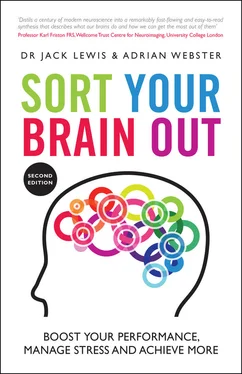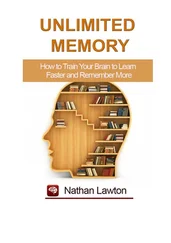The key to doing enough mental work to actually make a physical difference to how your brain functions is finding “Flow.” Flow is a psychological phenomenon made famous by Mihaly Csikszentmihalyi (pronounced “six‐cent‐mihal‐i) with a specific meaning that has been bandied around so much it has lost most of its original simplicity.
The average capacity of working memory is seven items. By regularly practising to hold more items of information than that in your mind (e.g. phone numbers, shopping lists or credit card numbers) for long enough to do something useful with them, you can increase your working memory. That in turn leads to improvements in your problem‐solving abilities.
To remember what Flow is all about, just think about Goldilocks. She wanted her porridge to be “not too hot, not too cold, but just right.” Flow comes when you challenge your brain with some kind of absorbing mental task that is “not too hard, not too easy, but just right” – it keeps you keen to keep on going and creates a state of mind where time just seems to fly by.
If it's too easy for you, keeping your head down for a solid half an hour might be no problem, but your brain will only invest resources in changing its connectivity if it is pushed out of its comfort zone. If, on the other hand, the challenge is too hard, you might end up feeling stupid, convincing yourself that you're getting nowhere and that the task is futile. That's no good because you'll only end up feeling all frustrated, wound up and looking for something less productive to do instead.
This, incidentally, is something that some of the new brain training games tend to be very good at – successful computer game designers are masters of finding this sweet spot: where the gaming experience is challenging but without leading to despair. At the same time, they are also extremely adept at getting people addicted to their products, so bear that in mind too!
Whatever brain training you do choose to do, whether it's getting to grips with a new software package, memorizing some useful numbers or perhaps learning how to cook a new dish – it will change your brain most efficiently if you manage to find Flow. This is because Flow keeps you at it for long enough to trigger brain changes. Having found Flow you'll no doubt have also experienced enjoyment from the process and taken away some real satisfaction from your achievements, so you'll likely be greeting the prospect of doing it again with enthusiasm rather than dread. Finding Flow in the next challenge will be key to ensuring that your self‐propelling belief keeps you going in the right direction and that your brain continues to invest in whatever rewiring is required.
At the age of 43, I published my first book – Polar Bear Pirates and Their Quest to Reach Fat City. Despite the fact that I had been told on more than one occasion that I would never be capable of writing a book, it became an international bestseller .
– Adrian
By doing brain training that improves your working memory – as far as your IQ is concerned – the only way is up.
If you want to make progress in developing new skills, you'll first need to learn to learn again. Do a little bit every day and you'll soon feel comfortable being out of your comfort zone, just like you did as a child.
To discover the positive effects of neuroplasticity and continue to improve at something, you need to do it regularly, intensively and over long periods. That's all “brain training” really is!
Step beyond set‐pieces. Stretch yourself. The easiest route in the short term is rarely the best path in the long run.
Remember the Goldilocks Rule as applied to “Flow” – set yourself goals that are not too easy, not too hard, but just right!
Yes, you can teach an old dog new tricks.
Cyber Heads
Brain for sale – no longer needed
Is technology good or bad for our brains? With around 4.5 billion active internet users, 41 million text‐based messages sent every minute and many people now spending more time gaming online than they do sleeping, are we all becoming mindless zombies, unable to interact with each other on a face‐to‐face basis? Or are people getting all worked up about nothing, worrying unnecessarily about the potential consequences of digital immersion that, in reality, pose no major threat to the future of the human race?
The more Facebook friends a person has, the greater the grey matter density in brain areas involved in social interaction.
The truth is it all depends on what type of technology you're talking about. It also depends on how intensively the technology in question is being used. And it depends on the specific person using the technology. As with most things the rule of thumb is this: Everything in moderation.
The main threat of many technologies is that many games and applications are often specifically designed to encourage overuse. The twin problems associated with using a certain technology for many hours every day are: 1) you will probably be diverting time away from other activities that would yield greater benefit for your productivity and well‐being and 2) you could well be triggering neuroplasticity that leaves your brain worse at meeting many of the challenges of everyday life rather than better .
Internet search engines make a whole world of information instantly available to us, literally putting the information at our fingertips. So why would anyone want to bother committing anything to memory when it can be pulled up on a screen within seconds? Recent studies have shown that this might not be a great idea.
When people know they can just search for the information again in the future, they retain what they've learned only for very short periods of time. It turns out that they're pretty good at knowing where to look to find this information again in the future. But until they do that, the information tends not to be available in their memory, posing a problem when it comes to getting wiser. No wonder conversations are forever being put on pause while people fiddle with their smartphones – to find those facts that they know, but can't quite remember.
Access: In 1984, there were one thousand devices hooked up to the internet across the globe. Eight years later, in 1992, this number hit the one million mark. The one billion mark was crossed in 2008. These days it makes more sense to count how many people in the world don't have some kind of access to the internet (fewer than 2 billion in 2020).
Quantity: By 2020 the digital world had been estimated to comprise 44 zettabytes (forty‐four thousand, billion, billion bytes). That's more bytes of data on the internet than there are stars in the universe .
Labour‐saving devices have unquestionably changed our lives beyond all recognition, but will the continuing tsunami of innovations leave us all with redundant brains, unable to do much without technological assistance? As yet, there are no conclusive answers to such questions. But you can rest assured that your brain will have been doing what brains do so brilliantly well – changing and adapting to meet the demands of the new digital environment it now spends the majority of the waking day immersed in. No matter how old your brain happens to be, it will already have been busy reconfiguring and shaping up to embrace whatever new challenges this ever‐expanding techno era happens to throw at it.
Our brains might have changed over the years we've been alive, but human nature – as determined by our DNA – has not. The main reason why we, out of approximately 8.7 million other species currently sharing this planet, have been so successful is largely down to a deep‐rooted desire to feel a sense of progress. Thanks to lightning‐speed technology, we are now all advancing at an ever‐increasing rate with everybody expecting everything to be done in an instant – we want it now! And if we don't get what we want fast enough, human nature is such that we'll always be on the lookout for a shortcut. As soon as one becomes available, we'll take it!
Читать дальше












